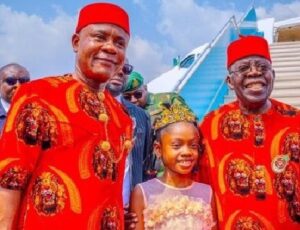Key Lessons from Tinubu’s Enugu Visit: A Look Toward 2027
Key Lessons from Tinubu’s Enugu Visit: A Look Toward 2027

During his recent visit to Enugu, President Bola Tinubu demonstrated a commitment to improving the region, particularly through his support for local development. His involvement with the University of Nigeria’s Zik Hostel project, initially hindered by bureaucratic red tape, led him to take a more ambitious approach by building a state-of-the-art 13,000-bed student hostel from the ground up. As this project nears completion, it stands as a testament to his vision for advancing educational infrastructure in the country.
However, his path to political influence in the Southeast has not been without challenges. In the 2023 election, President Tinubu garnered only 4,772 votes from Enugu, a state that overwhelmingly supported other candidates, such as Atiku Abubakar and Peter Obi. While some may attribute his lackluster performance to tribal politics, especially with the political rhetoric surrounding “Awa lokan,” a phrase used to define ethnic loyalty, it is clear that the region remains politically fragmented, and future success hinges on reconciliation and unity.
The dynamics of Nigerian politics, as the saying goes, are often akin to war, albeit without bloodshed. But the 2023 elections, filled with violence and tension, underscored the deep divides along ethnic and religious lines. Though regions like Kano recorded significant electoral violence, Enugu remained a bastion of relative peace. This is a critical backdrop to the President’s visit, as it signifies the need to foster peace and cooperation, particularly in states that were less supportive during the elections.
The warm welcome Tinubu received in Enugu, especially from local women in traditional attire, underscored the potential for building bridges between the President and the people of the Southeast. In their songs, they referred to him as “Orekelewa,” a Yoruba term for a cherished and highly respected individual. This symbolic gesture suggests the possibility of a renewed political partnership leading up to the 2027 election.
Tinubu’s visit also marked a significant moment for Enugu, as it was his first official state visit of the year. During this visit, he inaugurated various projects initiated by Governor Peter Mbah, who has been instrumental in transforming the state’s infrastructure. Notable among these projects were the completion of smart schools, a new international conference center, rural and urban roads, healthcare centers, and modern bus terminals. Governor Mbah’s administration has received praise for its progressive governance and impactful development in a short span of time.
Local government autonomy, another key area of focus for President Tinubu, was also discussed, with leaders like Dr. Ndu, Chairman of Ezeagu Local Government, expressing strong support for the President’s initiatives. These projects are expected to boost the region’s economic growth and build public confidence in both the federal and state leadership.
One of the most notable initiatives in Enugu is the ongoing construction of a 13,000-bed hostel at the University of Nigeria, Nsukka. Funded by Viagem Property & Investment, a company led by a prominent Lagos-based entrepreneur, this project exemplifies the kind of private-public partnership that could play a crucial role in addressing Nigeria’s infrastructure challenges. The businessman, who has deep ties to both Lagos and Enugu, sees this investment as a way to bridge the gap between regions and foster greater national unity.
The political landscape heading into 2027 will depend heavily on alliances like these. The President’s relationship with figures like Governor Mbah and the business community in Lagos could determine the success of future electoral campaigns. While regional politics often focus on ethnic and tribal affiliations, there is a growing recognition of the importance of transcending these divisions for the sake of national progress.
Ultimately, the President’s visit to Enugu serves as a reminder that political relationships in Nigeria are constantly evolving. As President Tinubu continues to build goodwill in the Southeast, the future of his administration—and the country as a whole—will be shaped by efforts to unite diverse regions and promote collaborative governance. Will this newfound partnership with Enugu pave the way for a stronger, more inclusive Nigeria? Time will tell, but it is clear that the groundwork for 2027 has already begun.
TRENDING SONGS
 NPMA Appeals to Nigerian Government for Compensation After Lagos Market Fire
NPMA Appeals to Nigerian Government for Compensation After Lagos Market Fire
 Rest Every Four Hours, FRSC Issues Safety Guide for Fasting Motorists
Rest Every Four Hours, FRSC Issues Safety Guide for Fasting Motorists
 NNPC Boss Ojulari Bags UK Energy Institute Fellowship
NNPC Boss Ojulari Bags UK Energy Institute Fellowship
 Shock in Anambra: Bride Disappears Moments Before Wedding
Shock in Anambra: Bride Disappears Moments Before Wedding
 Nigerian Woman Returns ₦330 Million Accidentally Credited to Her Account
Nigerian Woman Returns ₦330 Million Accidentally Credited to Her Account
 APC Don Reach Morocco?’ VeryDarkMan Reacts to Seyi Tinubu Poster
APC Don Reach Morocco?’ VeryDarkMan Reacts to Seyi Tinubu Poster
 Bride Breaks Down in Tears as Wedding Meals Were Kept Secretly While Guests Go Home Hungry
Bride Breaks Down in Tears as Wedding Meals Were Kept Secretly While Guests Go Home Hungry
 Odogwu by Day, Robber by Night: How Marriage Joy Turned Into Tragedy
Odogwu by Day, Robber by Night: How Marriage Joy Turned Into Tragedy
 Nigerian Officials Allegedly Pocket N4–6B Weekly Through Smuggling Cartels at Seme–Badagry Border
Nigerian Officials Allegedly Pocket N4–6B Weekly Through Smuggling Cartels at Seme–Badagry Border
 Ahmad Yerima: Naval Officer to Face No Sanctions After Clash with Wike – Matawalle
Ahmad Yerima: Naval Officer to Face No Sanctions After Clash with Wike – Matawalle
Share this post with your friends on ![]()













